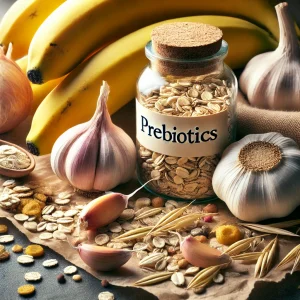
Gut health is emerging as one of the most critical components of overall wellness, influencing not just digestion but also mental health, immunity, and even chronic disease prevention. For anyone especially those balancing demanding careers or raising a family, maintaining a healthy gut can make a tangible difference in daily energy, mood, and long-term health. But what exactly makes a healthy gut, and how do probiotics, prebiotics, postbiotics, and bacteriophages fit into the picture?
Let’s break it down scientifically, so you can make informed decisions about your nutrition and lifestyle choices.
Probiotics: The Good Microbes that Keep You in Balance
Probiotics are live microorganisms that, when ingested in adequate amounts, offer health benefits, mainly by enhancing the gut flora. The gut microbiome, which is made up of trillions of bacteria, directly influences how efficiently your body digests food, absorbs nutrients, and defends against pathogens.
How They Work: Probiotics restore balance in the gut microbiota, particularly after disruptions caused by antibiotics, poor diet, or stress. By promoting beneficial bacteria like Lactobacillus and Bifidobacterium, probiotics help maintain a state of homeostasis in the gut, which is crucial for metabolic health and immune function.
The Science: Research has shown that certain strains of probiotics can reduce the incidence of digestive disorders, such as Irritable Bowel Syndrome (IBS), and even modulate immune responses, potentially reducing inflammation. Additionally, probiotics play a role in synthesizing key vitamins, such as B vitamins and vitamin K, and producing short-chain fatty acids (SCFAs), which are critical for gut barrier integrity.

Prebiotics: Fueling Your Gut Microbiome
Prebiotics are a specific type of fiber that your body cannot digest, but your gut bacteria can. They serve as the primary energy source for probiotics, enabling these beneficial bacteria to thrive and perform their critical functions.
How They Work: When prebiotics are consumed, they undergo fermentation in the colon, where they are broken down by gut bacteria. This process produces SCFAs, like butyrate, which not only nourish your intestinal cells but also have anti-inflammatory effects. By providing fuel for beneficial bacteria, prebiotics help to enhance gut biodiversity, which is essential for long-term health.
The Science: Prebiotic fibers, such as inulin and fructooligosaccharides (FOS), are found naturally in foods like garlic, onions, asparagus, and oats. Studies show that diets rich in prebiotics can improve bowel regularity, support immune function, and even enhance calcium absorption, promoting bone health. More importantly, a diverse gut microbiome, fueled by prebiotics, has been linked to lower rates of chronic conditions like heart disease and obesity.
Postbiotics: The Beneficial Byproducts
Postbiotics refer to the bioactive compounds produced by probiotics during fermentation. These byproducts include SCFAs, enzymes, and even antimicrobial peptides, all of which have profound effects on gut health.
How They Work: Once probiotics digest prebiotics, they produce a range of beneficial compounds that go beyond the gut. For instance, SCFAs like acetate, propionate, and butyrate not only support the gut lining but also play a role in regulating immune responses, reducing systemic inflammation, and improving metabolic health.
The Science: The emerging research on postbiotics highlights their potential in treating metabolic disorders, such as type 2 diabetes, and inflammatory diseases. Butyrate, in particular, has been shown to strengthen the gut barrier, protecting against “leaky gut,” which is linked to autoimmune diseases and chronic inflammation. While postbiotics are naturally produced within the body, they are now being researched as potential therapeutic agents in supplement form. Unlike probiotics, postbiotics are more stable as they do not require live bacteria, making them easier to store and incorporate so they have broad applications in food, beverages and gummies.

Bacteriophages: Precision Tools for Gut Health
Bacteriophages, often referred to as “phages,” are viruses that specifically target and destroy harmful bacteria without affecting the beneficial ones. While the idea of ingesting a virus might sound unsettling, bacteriophages occur naturally in many foods and are emerging as a precise method for managing gut health.
How They Work: Unlike broad-spectrum antibiotics, which wipe out both good and bad bacteria, phages selectively target harmful bacterial strains. This precision helps maintain a balanced microbiome by controlling pathogenic bacteria, such as E. coli and Salmonella, while leaving beneficial bacteria intact.
The Science: Phages are being explored as a natural alternative to antibiotics, particularly in food safety and gut health supplementation. Recent studies suggest that bacteriophage therapy could be an effective strategy for managing bacterial overgrowth conditions, such as Small Intestinal Bacterial Overgrowth (SIBO), without the risks of antibiotic resistance or microbiome disruption.
Conclusion: A Science-Backed Approach to Gut Health
We can safely conclude that gut health is more than a buzzword—it’s a foundation for overall well-being. By understanding the distinct roles of probiotics, prebiotics, postbiotics, and bacteriophages, you can make informed decisions to optimize your gut microbiome. A healthy gut doesn’t just improve digestion—it influences everything from immunity to mental clarity and even long-term metabolic health.
Incorporating a variety of fiber-rich foods, fermented products, and cutting-edge innovations like bacteriophages into your diet can help ensure that you’re supporting your body at its core. So go ahead! Take control of your health in an informed, scientific manner as you know now that gut health is the place to start.

Post Comments